Photo: JC Olivera/WireImage

news
2024 GRAMMYs In Memoriam: Stevie Wonder, Lenny Kravitz & More Pay Tribute To Late Icons
A star-studded tribute honored the late leading lights of the music industry. In a heartfelt and exciting segment, Tina Turner was remembered with a spirited cover of "Proud Mary" and while Stevie Wonder did a tender posthumous duet with Tony Bennett.
Oprah Winfrey, Stevie Wonder and more graced the GRAMMYs stage for a star-studded tribute to Tina Turner, Tony Bennett and other stars we lost in 2023.
The In Memoriam segment of the 2024 GRAMMYs began with Wonder honoring the "I Left My Heart in San Francisco" crooner, who passed away in July after a long battle with Alzheimer's. With Wonder on piano and an ethereal, archival video of Bennett singing, the two created a tearjerker posthumous duet of "For Once in My Life" before transitioning into "The Best is Yet to Come."
Next, a video memorialized Jimmy Buffett before a visibly emotional Annie Lennox appeared on stage with Wendy and Lisa to remember Sinead O'Connor with a tender cover of the late Irish alt pioneer's classic single "Nothing Compares 2 U." "Artists for ceasefire! Peace in the world!" the Eurythmics icon shouted with raised fist at the end of her performance.
Elsewhere during the In Memoriam package, Burt Bacharach was celebrated for his unmistakable impact on popular music throughout the 20th century. Then, Lenny Kravitz paid respect to Clarence Avant as the "Godfather of Black Music" with a tribute that included a performance of "Ain't No Sunshine" and "Lean on Me" by Jon Batiste. Ann Nesby, Jimmy Jam, Terry Lewis and others joined later to perform "Optimistic."
Read more: Remembering The Artistry Of Tina Turner, "The Epitome Of Power And Passion"
Last but certainly not least, Oprah Winfrey ushered in a tribute to Turner, saying "Tina Turner was always a towering figure. She is our forever goddess of rock and roll who inspired millions, a moving symbol of grace and grit, soul and power…And as those big wheels of time keep on turnin’, Tina’s voice continues to speak to all of us."
Following her remarks lionizing the Queen of Rock 'n Roll and nine-time GRAMMY winner, Oprah ceded the stage to Fantasia Barrino for a transcendent, celebratory performance (with much dancing, as Turner would have wanted) of "Proud Mary" that went from the stage to the audience and back.
2024 GRAMMY Nominations: See The Full Winners & Nominees List
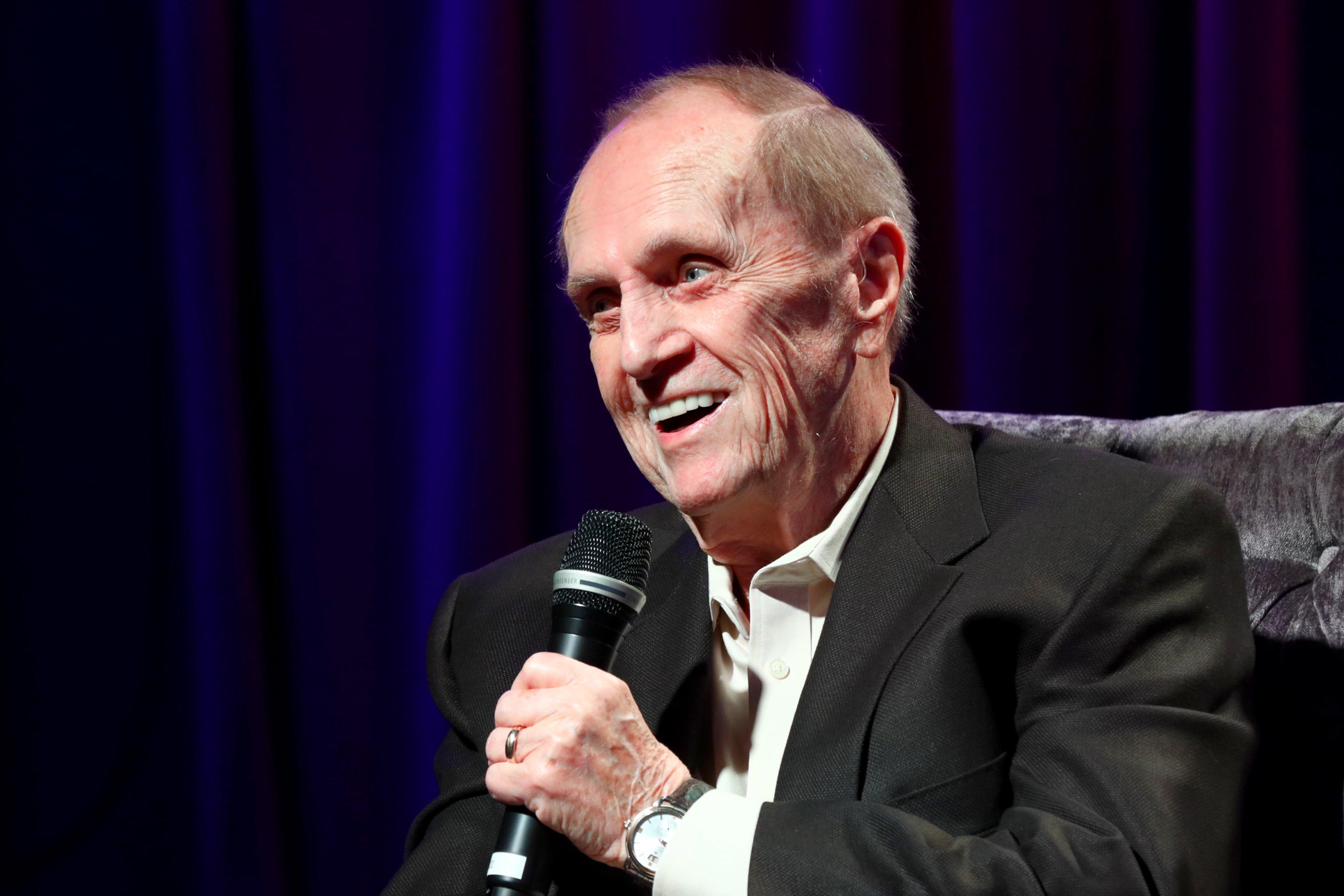
Photo: Rebecca Sapp/WireImage
news
Remembering Bob Newhart, The Comic Who Made GRAMMY History With His Debut Album
The legendary comic, whose work onstage and on screen spanned multiple generations, passed away at age 94 on July 18.
Bob Newhart, one of the most celebrated comedians of his generation and renowned for his deadpan delivery died at his home in Los Angeles on July 18. He was 94.
Awarded the John F. Kennedy Center for the Performing Arts’ Mark Twain Prize for American Humor in 2002, Newhart launched his career with a record-setting record. By the time he transitioned to television with two successful sitcoms, he had become a household name.
Newhart made his vinyl debut on April Fool’s Day in 1960, when Warner Brothers Records released his first comedy album, The Button-Down Mind of Bob Newhart. A year later, at the 3rd GRAMMY Awards, the former accountant-turned-comic took home three golden gramophones.
At the 1961 GRAMMYs, Newhart won Album Of The Year — beating out two classical albums as well as works by Nat King Cole, Frank Sinatra and Harry Belafonte. Newhart also won Best New Artist at that year's ceremony and, to this day, is the only comedian to win in both categories.
Recorded live on Feb. 10, 1960 at the Tidelands Motor Inn in Houston, Button Down Mind also became the first comedy audio album to reach No. 1 on the Billboard 200 chart. The album is widely considered to be one of the most consequential comedy albums of the 20th century and, fittingly, features the subtitle The Most Celebrated New Comedian Since Attila (the Hun).
The album was added to the Library of Congress’s National Recording Registry in 1960. That year, The New York Times noted that Newhart was “the first comedian in history to come to prominence through a recording.” In 2007, the Recording Academy inducted The Button-Down Mind of Bob Newhart into the GRAMMY Hall of Fame.
His second album, The Button-Down Mind Strikes Back!, similarly topped the Billboard charts and earned Newhart his third GRAMMY Award, this time for Best Comedy Performance — Spoken Word.
Newhart received two additional GRAMMY nods during this illustrious career: His Button Down Concert album was nominated for Best Spoken Comedy Album at the 40th GRAMMY Awards, and nine years later his I Shouldn't Even Be Doing This! was nominated for Best Spoken Word Album.a
The success of Button-Down Mind led to the launch of Newhart's long TV career. His NBC variety show, "The Bob Newhart Shot" only lasted one season, but earned an Emmy for Outstanding Comedy Series in 1962. Newhart found greater success through CBS, which broadcast a series of the same name. On the second "The Bob Newhart Show," which ran from 1972 to 1978, the comic actor played a psychologist,
Four years later, he followed up with another sitcom, "Newhart," which aired until 1990 and in which Newhart played a Vermont innkeeper.
Bob Newhart has continued to have a presence on the small screen. His recording debut has been referenced in a variety of contemporary period shows, including "Mad Men" and "The Marvelous Mrs. Maisel."
During his decades-long television career, Newhart received nine EMMY nominations, including as Outstanding Lead Actor in a Comedy Series over three consecutive years for "Newhart" and three for Outstanding Guest Actor in a Comedy Series for his appearances on CBS’ "The Big Bang Theory."
Born George Robert Newhart on Sept. 5, 1929, in Oak Park, Illinois, Newhart graduated from Loyola University of Chicago in 1952 with a degree in accounting. After serving in the Army during the Korean War, he returned to Loyola for law school, but dropped out and pursued office work.
Newhart worked as an accountant for United States Gypsum Corp., which manufactures construction materials, and later as a copywrighter for Fred Niles Films Company in Chicago. During that time, Newhart began recording "long, antic" phone calls with a friend as audition tapes for comedy jobs. They caught the attention of a Chicago disc jockey, who introduced Newhart to the head of talent at Warner Bros. Records and which led to a life-changing contract in 1959.
It was in the latter category that Newhart won his first and only Emmy in 2013, 20 years after the Academy of Television Arts and Sciences inducted him into its Hall of Fame.
Remembering Legends & History-Makers
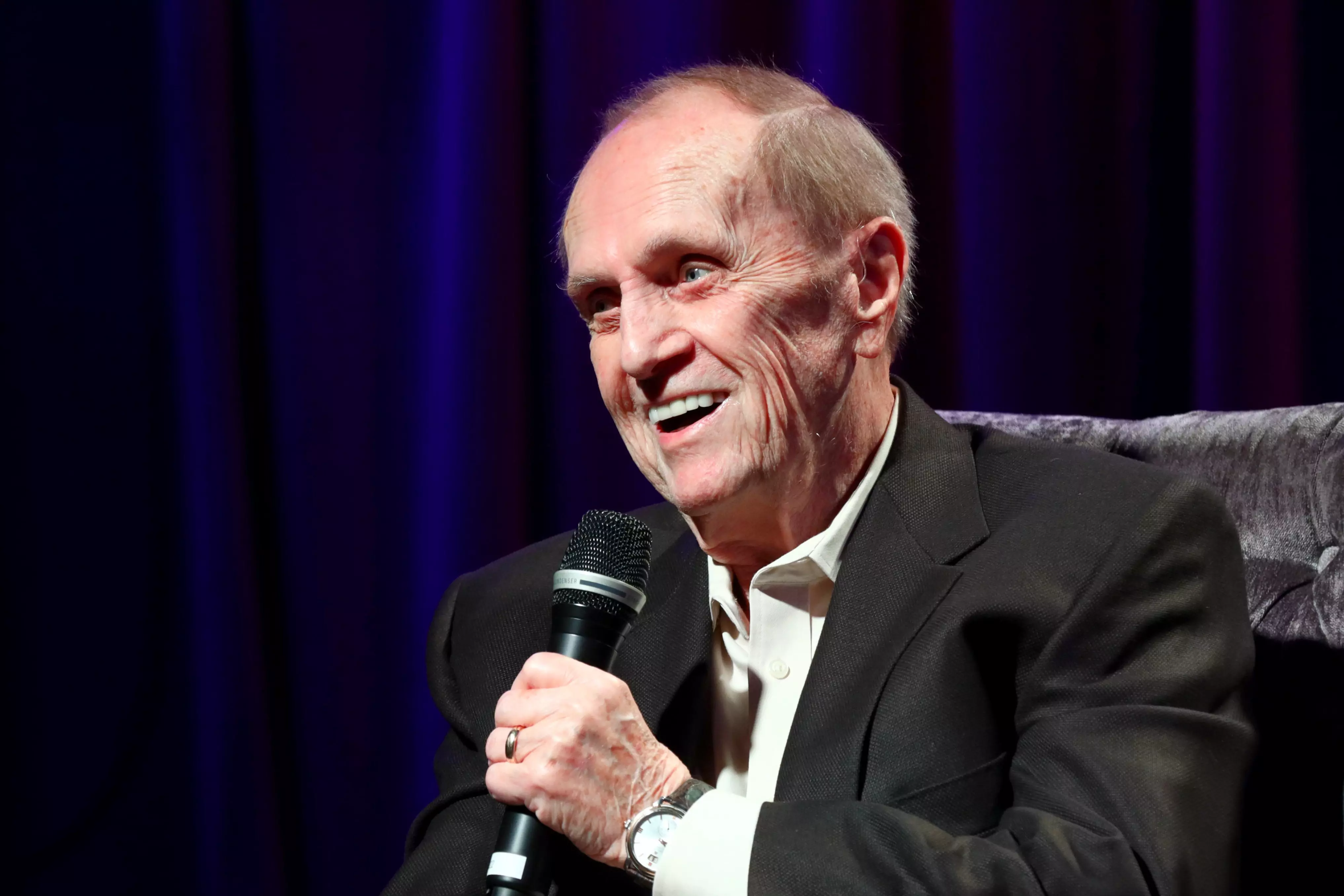
Remembering Bob Newhart, The Comic Who Made GRAMMY History With His Debut Album

2024 GRAMMYs In Memoriam: Stevie Wonder, Lenny Kravitz & More Pay Tribute To Late Icons
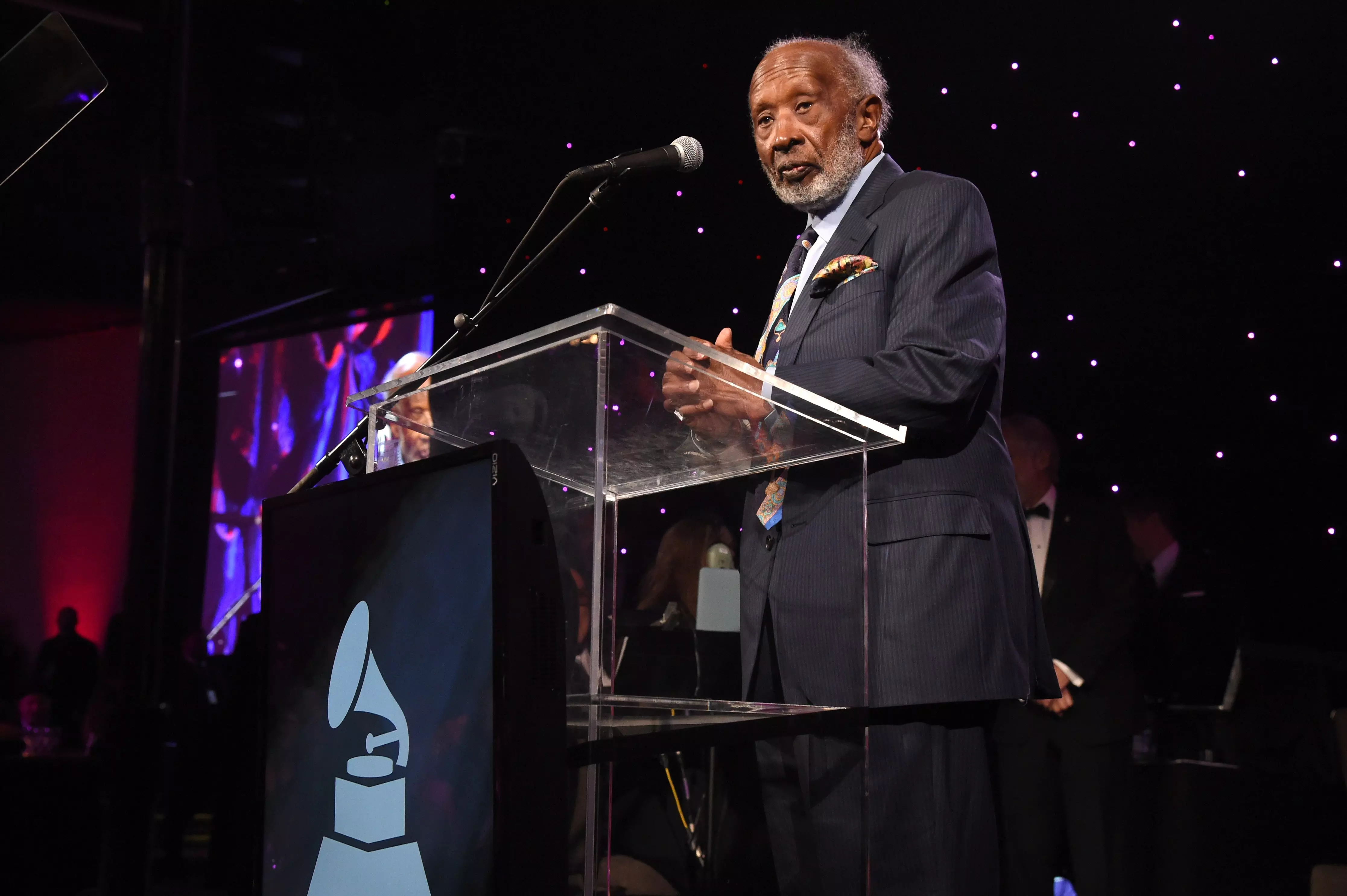
Remembering Clarence Avant: The Black Godfather, Renowned Entertainment Mentor & Recording Academy Honoree
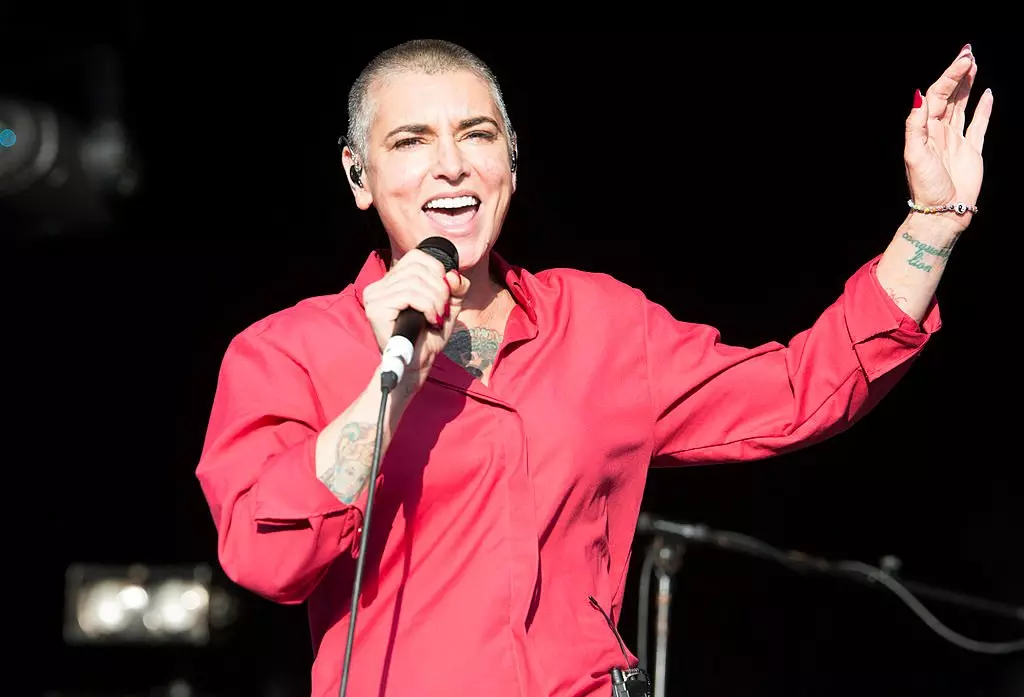
Remembering Sinéad O’Connor: 5 Essential Tracks By The Iconoclastic Singer/Songwriter
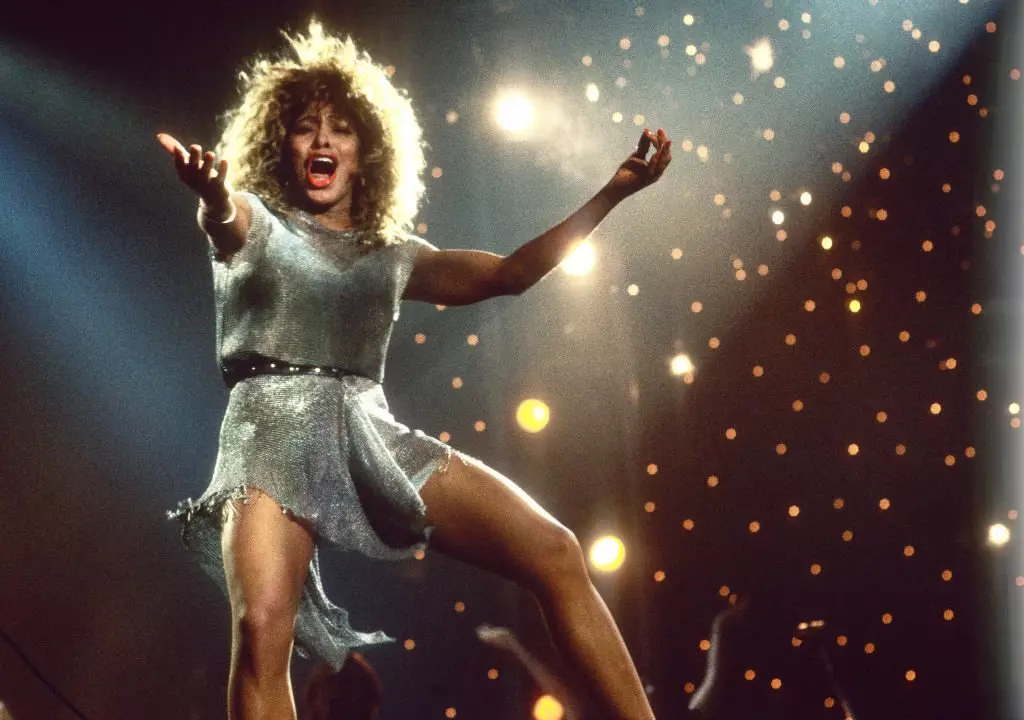
Remembering The Artistry Of Tina Turner, "The Epitome Of Power And Passion"
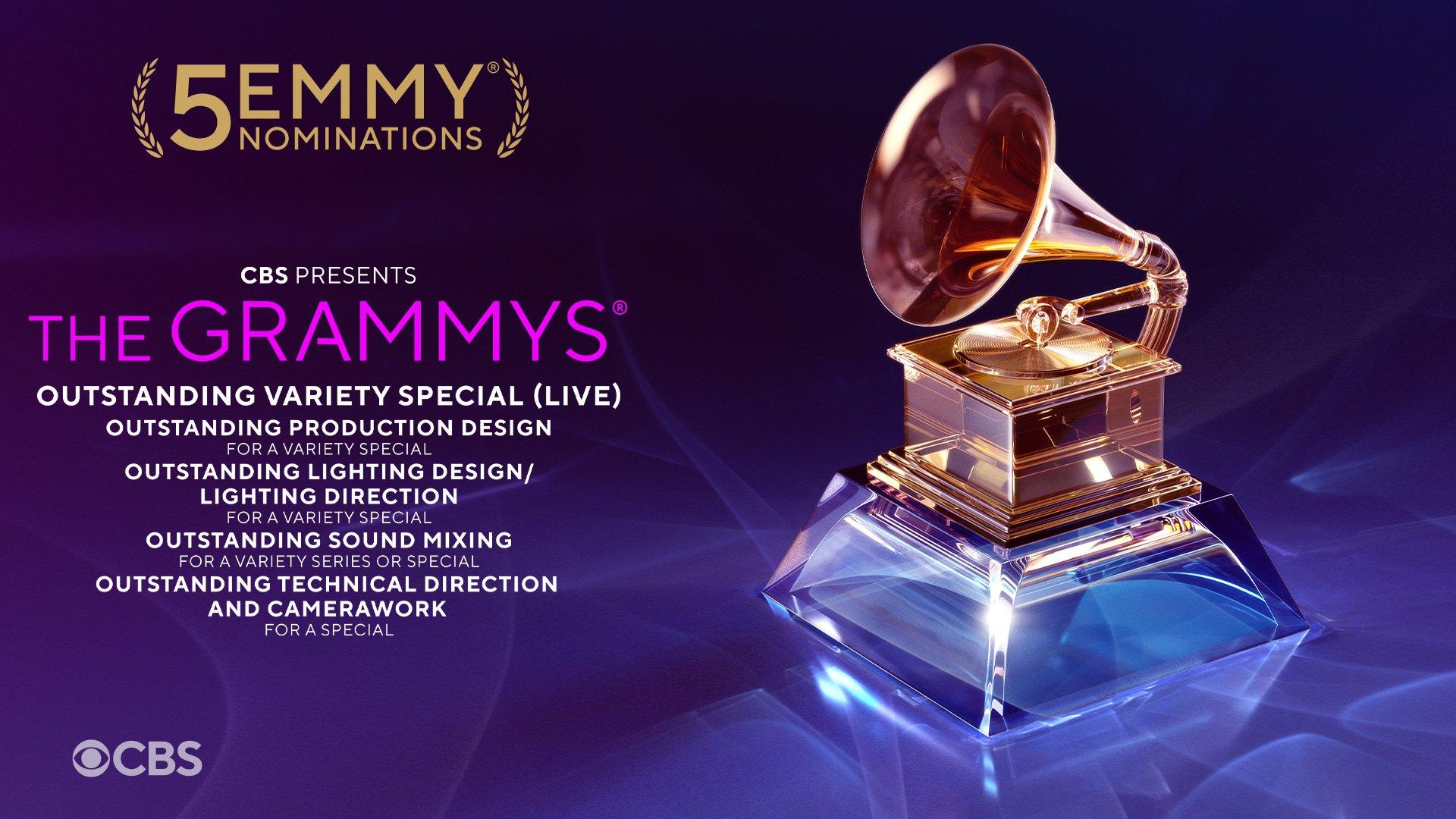
Graphic Courtesy of CBS
news
The 2024 GRAMMYs Have Been Nominated For 5 Emmys: See Which Categories
The 2024 GRAMMYs telecast is nominated for Outstanding Variety Special (Live), Outstanding Production Design For A Variety Special, and three more awards at the 2024 Emmys, which take place Sunday, Sept. 15.
It’s officially awards season! Today, the nominees for the 2024 Emmys dropped — and, happily, the 2024 GRAMMYs telecast received a whopping five nominations.
At the 2024 Emmys, the 2024 GRAMMYs telecast is currently nominated for Outstanding Variety Special (Live), Outstanding Production Design for a Variety Special, Outstanding Lighting Design/Lighting Direction for a Variety Special, Outstanding Sound Mixing for a Variety Series or Special, and Outstanding Technical Direction and Camerawork for a Special.
Across these categories, this puts Music’s Biggest Night in a friendly head-to-head with other prestigious awards shows and live variety specials, including the Super Bowl LVIII Halftime Show starring Usher as well as fellow awards shows the Oscars and the Tonys.
2024 was a banner year for the GRAMMYs. Music heroes returned to the spotlight; across Categories, so many new stars were minted. New GRAMMY Categories received their inaugural winners: Best African Music Performance, Best Alternative Jazz Album and Best Pop Dance Recording. Culture-shaking performances and acceptance speeches went down. Those we lost received a loving farewell via the In Memoriam segment.
The 2025 GRAMMYs will take place Sunday, Feb. 2, live at Crypto.com Arena in Los Angeles and will broadcast live on the CBS Television Network and stream live and on demand on Paramount+. Nominations for the 2025 GRAMMYs will be announced Friday, Nov. 8, 2024.
For more information about the 2025 GRAMMY Awards season, learn more about the annual GRAMMY Awards process, read our FAQ (Frequently Asked Questions) section, view the official GRAMMY Awards Rules and Guidelines, and visit the GRAMMY Award Update Center for a list of real-time changes to the GRAMMY Awards process.
GRAMMY News, Performances & Highlights
2025 GRAMMYs To Take Place Sunday, Feb. 2, Live In Los Angeles; GRAMMY Awards Nominations To Be Announced Friday, Nov. 8, 2024
GRAMMY Awards Updates For The 2025 GRAMMYs: Here's Everything You Need To Know About GRAMMY Awards Categories Changes & Eligibility Guidelines
How To Submit Your Music For The 2025 GRAMMYs: Deadlines & Webinars, GRAMMY Nominations & Voting Process, And More
2024 GRAMMYs: See The Full Winners & Nominees List
The 2024 GRAMMYs Have Been Nominated For 5 Emmys: See Which Categories
10 Must-See Moments From The 2024 GRAMMYs: Taylor Swift Makes History, Billy Joel & Tracy Chapman Return, Boygenius Manifest Childhood Dreams
Watch All The Performances From The 2024 GRAMMYs: Tracy Chapman & Luke Combs, Billie Eilish, Olivia Rodrigo & More
2024 GRAMMYs: Miley Cyrus Celebrates "Flowers" GRAMMY Win With Jubilant Performance
2024 GRAMMYs: Dua Lipa Debuts "Training Season" & Slays "Houdini" In Mesmerizing Opening Performance
2024 GRAMMYs: Taylor Swift Makes GRAMMY History With Fourth Album Of The Year Win For 'Midnights'
2024 GRAMMYs: Billie Eilish Performs An Ethereal Rendition Of "What Was I Made For?"
2024 GRAMMYs: Watch Olivia Rodrigo Bleed Her Soul Dry With Dramatic "Vampire" Performance
SZA Wakes Up The 2024 GRAMMYs With A Performance Of "Snooze" & "Kill Bill"
2024 GRAMMYs: Luke Combs & Tracy Chapman Team Up For A Surprise Duet Version Of "Fast Car"
2024 GRAMMYs: Burna Boy's Fantastic Afro-Fusion Lights Up The Stage
2024 GRAMMYs: Travis Scott Turns Music's Biggest Night Into A Heated Utopia
2024 GRAMMYs: Watch Joni Mitchell Deliver Heartwarming Performance Of "Both Sides Now" In Her GRAMMY Stage Debut
U2 Performs "Atomic City" & Transports The 2024 GRAMMYs To Las Vegas
2024 GRAMMYs In Memoriam: Stevie Wonder, Lenny Kravitz & More Pay Tribute To Late Icons
2024 GRAMMYs: Billie Eilish Wins GRAMMY For Song Of The Year For "What Was I Made For?" From The 'Barbie' Soundtrack
2024 GRAMMYs: Miley Cyrus Wins The GRAMMY For Record Of The Year for "Flowers"
2024 GRAMMYs: Victoria Monét Wins The GRAMMY For Best New Artist
2024 GRAMMYs: Jack Antonoff Wins GRAMMY For Producer Of The Year, Non-Classical For The Third Year In A Row

Theron Thomas Wins Songwriter Of The Year, Non-Classical | 2024 GRAMMYs Acceptance Speech

Watch Taylor Swift Walk The 2024 GRAMMYs Red Carpet
2024 GRAMMYs: Jay-Z Receives Dr. Dre Global Impact Award
Relive The 2024 GRAMMYs Red Carpet: Interviews With Dua Lipa, Ice Spice & More
10 Acceptance Speeches That Made Us Laugh, Cry, & Smile At The 2024 GRAMMYs
Big First Wins At The 2024 GRAMMYs: Karol G, Lainey Wilson, Victoria Monét & More
13 Moments From The 2024 GRAMMYs You Might Have Missed
2024 GRAMMYs Red Carpet Fashion Highlights: Taylor Swift, Dua Lipa, Billie Eilish, Olivia Rodrigo, boygenius & More
9 Ways Women Dominated The 2024 GRAMMYs
Overheard Backstage At The 2024 GRAMMYs: What Jack Antonoff, Laufey & Other GRAMMY Winners Said
How The 2024 GRAMMYs Saw The Return Of Music Heroes & Birthed New Icons
Taylor Swift Announces New Album After 13th GRAMMY Win At The 2024 GRAMMYs
2024 GRAMMYs: Miley Cyrus Wins First-Ever GRAMMY For "Flowers"

Billie Eilish Wins Best Song Written For Visual Media For "What Was I Made For?" (From 'Barbie The Album') | 2024 GRAMMYs Acceptance Speech
2024 GRAMMYs: Karol G Wins The First GRAMMY Award Of Her Career For Best Música Urbana Album

Watch Ice Spice’s 2024 GRAMMYs Red Carpet Interview

boygenius Celebrate Their Three GRAMMY Wins At The CNB "First Look" Cam At The 2024 GRAMMYs Premiere Ceremony
In Memoriam (2023): The Recording Academy Remembers The Music People We Lost

Killer Mike Wins Best Rap Album For 'MICHAEL' | 2024 GRAMMYs Acceptance Speech
2024 GRAMMYs: Tyla Wins First-Ever GRAMMY Award For Best African Music Performance

Watch Billie Eilish & FINNEAS’ 2024 GRAMMYs Red Carpet Interview

Boygenius Wins Best Rock Song For "Not Strong Enough" | 2024 GRAMMYs Acceptance Speech
Burna Boy, Tyla And Africa's Moment At The 2024 GRAMMYs

Photo: Jathan Campbell
list
How Much Is A GRAMMY Worth? 7 Facts To Know About The GRAMMY Award Trophy
Here are seven facts to know about the actual cost and worth of a GRAMMY trophy, presented once a year by the Recording Academy at the GRAMMY Awards.
Since 1959, the GRAMMY Award has been music’s most coveted honor. Each year at the annual GRAMMY Awards, GRAMMY-winning and -nominated artists are recognized for their musical excellence by their peers. Their lives are forever changed — so are their career trajectories. And when you have questions about the GRAMMYs, we have answers.
Here are seven facts to know about the value of the GRAMMY trophy.
How Much Does A GRAMMY Trophy Cost To Make?
The cost to produce a GRAMMY Award trophy, including labor and materials, is nearly $800. Bob Graves, who cast the original GRAMMY mold inside his garage in 1958, passed on his legacy to John Billings, his neighbor, in 1983. Billings, also known as "The GRAMMY Man," designed the current model in use, which debuted in 1991.
How Long Does It Take To Make A GRAMMY Trophy?
Billings and his crew work on making GRAMMY trophies throughout the year. Each GRAMMY is handmade, and each GRAMMY Award trophy takes 15 hours to produce.
Where Are The GRAMMY Trophies Made?
While Los Angeles is the headquarters of the Recording Academy and the GRAMMYs, and regularly the home of the annual GRAMMY Awards, GRAMMY trophies are produced at Billings Artworks in Ridgway, Colorado, about 800 miles away from L.A.
Is The GRAMMY Award Made Of Real Gold?
GRAMMY Awards are made of a trademarked alloy called "Grammium" — a secret zinc alloy — and are plated with 24-karat gold.
How Many GRAMMY Trophies Are Made Per Year?
Approximately 600-800 GRAMMY Award trophies are produced per year. This includes both GRAMMY Awards and Latin GRAMMY Awards for the two Academies; the number of GRAMMYs manufactured each year always depends on the number of winners and Categories we award across both award shows.
Fun fact: The two GRAMMY trophies have different-colored bases. The GRAMMY Award has a black base, while the Latin GRAMMY Award has a burgundy base.
Photos: Gabriel Bouys/AFP via Getty Images; Frederick M. Brown/Getty Images
How Much Does A GRAMMY Weigh?
The GRAMMY trophy weighs approximately 5 pounds. The trophy's height is 9-and-a-half inches. The trophy's width is nearly 6 inches by 6 inches.
What Is The True Value Of A GRAMMY?
Winning a GRAMMY, and even just being nominated for a GRAMMY, has an immeasurable positive impact on the nominated and winning artists. It opens up new career avenues, builds global awareness of artists, and ultimately solidifies a creator’s place in history. Since the GRAMMY Award is the only peer-voted award in music, this means artists are recognized, awarded and celebrated by those in their fields and industries, ultimately making the value of a GRAMMY truly priceless and immeasurable.
In an interview featured in the 2024 GRAMMYs program book, two-time GRAMMY winner Lauren Daigle spoke of the value and impact of a GRAMMY Award. "Time has passed since I got my [first] GRAMMYs, but the rooms that I am now able to sit in, with some of the most incredible writers, producers and performers on the planet, is truly the greatest gift of all."
"Once you have that credential, it's a different certification. It definitely holds weight," two-time GRAMMY winner Tariq "Black Thought" Trotter of the Roots added. "It's a huge stamp as far as branding, businesswise, achievement-wise and in every regard. What the GRAMMY means to people, fans and artists is ever-evolving."
As Billboard explains, artists will often see significant boosts in album sales and streaming numbers after winning a GRAMMY or performing on the GRAMMY stage. This is known as the "GRAMMY Effect," an industry phenomenon in which a GRAMMY accolade directly influences the music biz and the wider popular culture.
For new artists in particular, the "GRAMMY Effect" has immensely helped rising creators reach new professional heights. Samara Joy, who won the GRAMMY for Best New Artist at the 2023 GRAMMYs, saw a 989% boost in sales and a 670% increase in on-demand streams for her album Linger Awhile, which won the GRAMMY for Best Jazz Vocal Album that same night. H.E.R., a former Best New Artist nominee, saw a massive 6,771% increase in song sales for her hit “I Can’t Breathe” on the day it won the GRAMMY for Song Of The Year at the 2021 GRAMMYs, compared to the day before, Rolling Stone reports.
Throughout the decades, past Best New Artist winners have continued to dominate the music industry and charts since taking home the GRAMMY gold — and continue to do so to this day. Recently, Best New Artist winners dominated the music industry and charts in 2023: Billie Eilish (2020 winner) sold 2 million equivalent album units, Olivia Rodrigo (2022 winner) sold 2.1 million equivalent album units, and Adele (2009 winner) sold 1.3 million equivalent album units. Elsewhere, past Best New Artist winners have gone on to star in major Hollywood blockbusters (Dua Lipa); headline arena tours and sign major brand deals (Megan Thee Stallion); become LGBTIA+ icons (Sam Smith); and reach multiplatinum status (John Legend).
Most recently, several winners, nominees and performers at the 2024 GRAMMYs saw significant bumps in U.S. streams and sales: Tracy Chapman's classic, GRAMMY-winning single "Fast Car," which she performed alongside Luke Combs, returned to the Billboard Hot 100 chart for the first time since 1988, when the song was originally released, according to Billboard. Fellow icon Joni Mitchell saw her ‘60s classic “Both Sides, Now,” hit the top 10 on the Digital Song Sales chart, Billboard reports.
In addition to financial gains, artists also experience significant professional wins as a result of their GRAMMY accolades. For instance, after she won the GRAMMY for Best Reggae Album for Rapture at the 2020 GRAMMYs, Koffee signed a U.S. record deal; after his first GRAMMYs in 2014, Kendrick Lamar saw a 349% increase in his Instagram following, Billboard reports.
Visit our interactive GRAMMY Awards Journey page to learn more about the GRAMMY Awards and the voting process behind the annual ceremony.
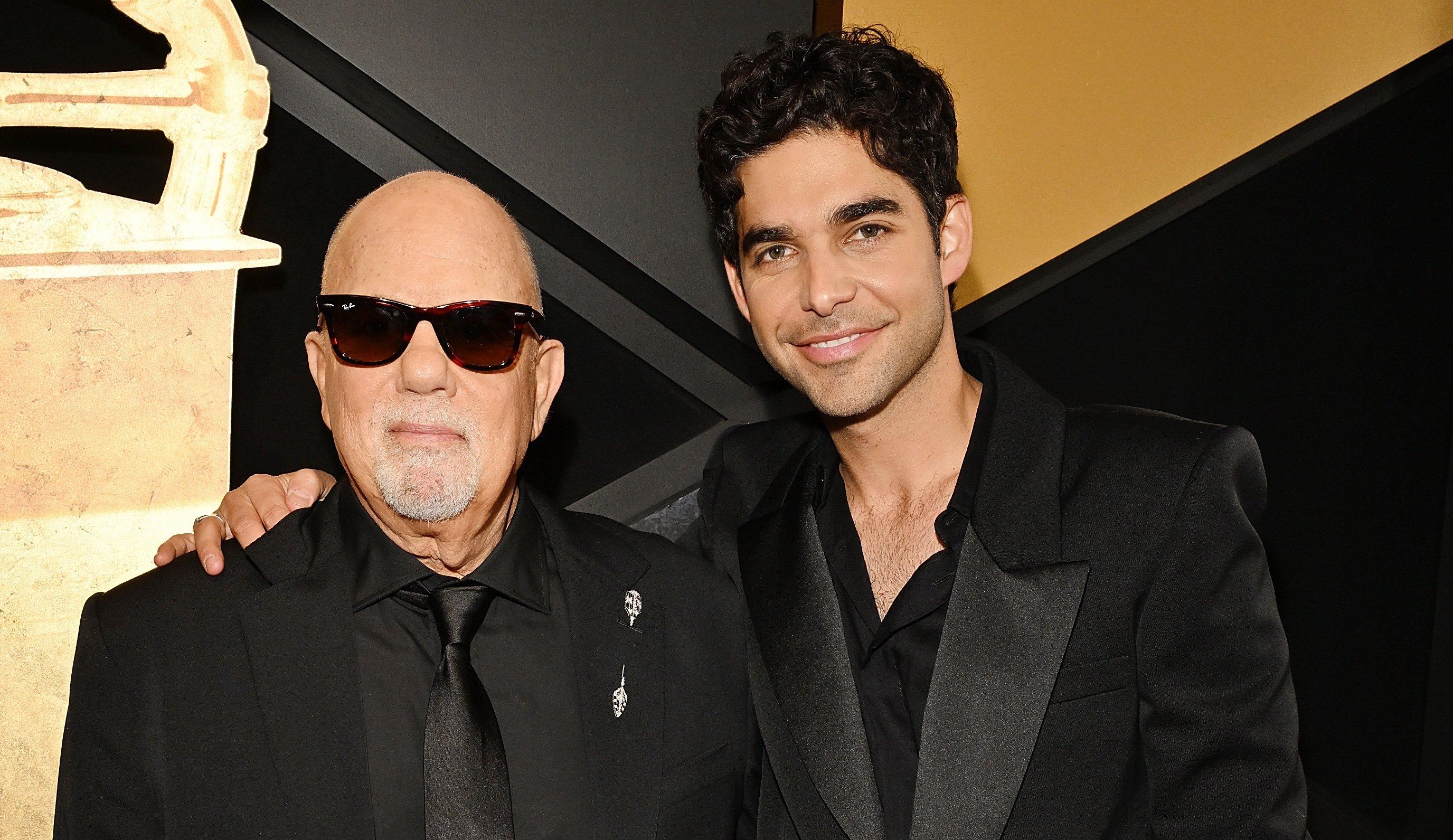
(L-R) Billy Joel, Freddy Wexler
interview
Freddy Wexler On Helping Billy Joel "Turn The Lights Back On" — At The 2024 GRAMMYs And Beyond
"Part of what was so beautiful for me to see on GRAMMY night was the respect and adoration that people of all ages and from all genres have for Billy Joel," Wexler says of Joel's 2024 GRAMMYs performance of their co-written "Turn The Lights Back On."
They say to not meet your heroes. But when Freddy Wexler — a lifelong Billy Joel fan — did just that, it was as if Joel walked straight out of his record collection.
"I think the truth is none of it is that surprising," the 37-year-old songwriter and producer tells GRAMMY.com. "That's the best part. From his music, I would've thought this is a humble, brilliant everyman who probably walks around with a very grounded perspective, and that's exactly who he is."
That groundedness made possible "Turn the Lights Back On" — the hit comeback single they co-wrote, and Wexler co-produced; Joel performed a resplendent version at the 2024 GRAMMYs with Laufey. Joel hadn't released a pop album since 1993's River of Dreams; for him to return to the throne would take an awfully demonstrative song, true to his life.
"I think it's a very raw, honest, real perspective that is true to Billy," Wexler explains. "I think it's the first time we've heard him acknowledge mistakes and regret in quite this way."
Specifically, Joel's return highlights his regret over spending three decades mostly on the bench, largely absent from the pop scene. As Joel wonders aloud in the stirring, arpeggiated chorus, "Is there still time for forgiveness?"
"Forgiveness" is a curious word. Why would the five-time GRAMMY winner and 23-time nominee possibly need to seek forgiveness? Regardless — as the song goes — he's "tryin' to find the magic/ That we lost somehow." The song's message — an attempt to recapture a lost essence — transcends Joel's personal headspace, connecting with a universal longing and nostalgia.
Read on for an interview with Wexler about the impact of "Turn the Lights Back On," why he thinks Joel took such an extended sabbatical, the prospect of more new music, and much more.
This interview has been edited for clarity.
**You did a great interview with Rolling Stone ahead of the 2024 GRAMMYs. Now, we're on the other side of it; you got to see how it went down on the telecast, and resonated with the audience and world. What was that like?**
It's why I make music — to hopefully make people feel something. This song has really resonated in such a big way. More than looking at its commercial success on the charts or on radio, which has been awesome to see, the comments on Instagram and YouTube have been the most rewarding part of it.
Why do you think it resonated? Beyond the king picking up his crown again?
I don't think the song is trying to be anything it's not. I think it's a very raw, honest, real perspective that is true to Billy. I think it's the first time we've heard him acknowledge mistakes and regret in quite this way. And to hear him do it in a hopeful way where he's asking, "Is it too late for forgiveness?" is just very moving, I think.
Forgiveness? That's interesting. What would any of us need to forgive him?
He has said in other interviews, "Sometimes people say they have no regrets at the end of their life." And he said, "I don't think that's possible. If you've lived a full life, of course you have regrets." He has said that he has many things he wishes he would've done differently. This is an opportunity to express that.
I think what's interesting about the song is it has found meaning in various ways with various people and listeners. Some people imagine Billy is singing to former lovers or friends. Other people imagine Billy is singing to his fans asking, "Did I wait too long to record again?" Other people wonder if Billy is singing to the songwriting Gods and muses. Did I wait too long to write again?
In Israel, where the song was number one — or is number one, I haven't checked today — I think the song's taken on the meaning of just wanting things to be normal, wanting hostages to come home and turn the lights back on. So, you never know where a song is going to resonate, but I think that Billy just found his own meaning with it.
You know the discography front to back. What lines can you draw from "Turn the Lights Back On" to past works?
I think it draws on various pieces of his catalog, right? "She's Always a Woman" has a sort of piano arpeggio in the chorus. To me, it feels like a natural progression. It feels like, on the one hand, it's a new song. On the other, it could have come out right after River of Dreams. To me, it just kind of feels natural.
**Back when you spoke with Rolling Stone, you said you couldn't wait to hear "Turn the Lights Back On" at Madison Square Garden. How'd it sound?**
Amazing. Billy is a consummate live performer. I think he's one of the few artists where everything is better live, and everything is always a little bit different each time it's played live.
It's been really cool to watch Billy and the band continue to change and improve the song and the song's dynamics for the show. He told me tonight that tomorrow night in Tampa, I think they're going to try to play with the key of the song, potentially — try it a half a step higher.
Those are the sort of things I think great artists do, right? It's different from being on a certain type of tour where every single song is the same, the set list is the same, the key is the same, the arrangements are the same.
With Billy, there's a lot of feeling and, "Hey, why don't we try it this way? Let's play it a little faster. Let's play it a little slower. Let's try it in a different key." I just think that's super cool. You have to be a really good musician to just do that on the fly.
What have you learned from him that applies to your music making, writ large?
I've learned so much from him. As Olivia Rodrigo said to us at GRAMMY rehearsals, "He's the blueprint when it comes to songwriting."
He has helped raise the bar for me when it comes to melodies and lyrics, but the thing I keep coming back to is he's reminded me that even the greatest artists and songwriters ever sometimes forget how great they are. I think we need to be careful not to give that inner voice and inner critic too much power.
Can you talk about how the music video came to be?
Well, I had a dream that Billy was singing the opening two lines of the song, but it was a 25-year-old version of Billy. It was arresting.
When I woke up, I sort of had the vision for the video, which was one set, an empty venue of some kind, and four Billy Joels. The Billy Joel that really exists today, but then three Billys from three iconic eras where each Billy would seamlessly pick up the song where the other left off.
The idea behind that was to sort of accentuate the question of the song — did I wait too long to turn the lights back on?
And so, to kind of take us through time and through all these years, I teamed up with an amazing co-director, Warren Fu, who's done everything from Dua Lipa to Daft Punk, and an artificial intelligence company called Deep Voodoo to make that vision possible.
What I'm driven by is the opportunity to create conversations, cultural moments, things that make people feel something. What was cool here is as scary as AI is — and I think it is scary in many ways — we were able to give an example of how you can use it in a positive way to execute a creative artistic vision that previously would've been impossible to execute.
Yeah, so I'm pleased with it and I'm thankful that Billy did a video. He didn't have to do one, but he liked the idea of it. He felt it was different, and I think he was moved by it as well.
What do you think is the next step here?
It's been a really rewarding process. And Billy is open-minded, which is really cool for an artist of that level, who's not a new artist by any stretch. To actually be described as being in a place in his life where he's open-minded, means anything is possible. I could tell you that I would love there to be more music.
I'd love to get your honest appraisal. And I know you're not him. But his last pop album was released 31 years ago. In that long interim, what do you think was going on with him, creatively?
Look, I'm not Billy Joel, but I think there were a number of factors going on with him. Somewhere along the way, I think he stopped having fun with music, which is the reason he got into it, or which is a big part of the reason he got into it. When it stopped being fun, I don't think he really wanted to do it anymore.
Another piece to it is that Billy is a perfectionist, and that perfectionism is evident in the caliber of his songwriting. Having always written 100 percent of his songs, Billy at some point probably found that process to be painstaking, to try to hit that bar where he's probably wondering in his head, What would Beethoven think of this? What would Leonard Bernstein think of this?
I think part of what was different here was that, perhaps, there was something liberating about "Turn the Lights Back On" being a seed that was brought to Billy. In this way, he could be a little disconnected from it, where maybe he didn't have to have the self-imposed pressure that he would if it was an idea that he'd been trying to finish for a while.
Ironically, he still made it. Well, there's no "ironically," but I think that's it. There's something to that.
Billy Joel's Biggest Songs: 15 Tracks That Best Showcase The Piano Man's Storytelling And Pop Hooks
